- Home
- Georgette Heyer
No Wind of Blame Page 26
No Wind of Blame Read online
Page 26
‘Well, I don’t know,’ said Small. ‘You wouldn’t hardly expect him to give away anything she may have said to him, would you?’
‘No, nor I wouldn’t expect him to be so much on his guard that he leaves the house sooner than let me ask him a few questions,’ retorted Hemingway.
‘You think he knows something against Steel?’
‘I wouldn’t go as far as to say that, but I’ve a strong notion that he’s got his suspicions. Of course, he may know something highly incriminating about one of those two girls. On the face of it, though, I’d say it’s Steel he’s shielding.’
‘Or the Prince,’ interpolated Wake.
‘No,’ replied the Inspector positively. ‘Not since he’s had him staying in his house. It wouldn’t be human nature for him to want to protect that chap.’
‘Do you think he saw something?’ asked the Superintendent. ‘According to what he told Cook, he was called out to a case on Sunday afternoon, and must have driven past the Dower House. Did you happen to ask him?’
‘No,’ replied Hemingway. ‘I didn’t, because I knew what answer I’d get.’ He looked at his watch. ‘Well, I’m off to have a heart-to-heart with Mr Harold White. He ought to be back from his work by now.’
‘You’re going to question him about that tale you had from Mr Dering and Miss Fanshawe?’ said Wake. ‘Myself, I can’t see that it’s got anything to do with the murder.’
‘I’ve been told it’s probably the clue to the whole mystery,’ responded Hemingway.
Wake blinked. ‘You have, sir? Who told you that?’
‘Miss Fanshawe did,’ said Hemingway.
The Superintendent was so astonished by this answer that for some time after Hemingway had left the room he sat turning it over in his mind. Finally he said in somewhat severe accents: ‘What does Miss Fanshawe know about it? Seems a funny thing to me to act on what a kid like that says!’
‘That’s all right, sir: it’s only his way of talking,’ said Wake indulgently. ‘Sharp as a needle, he is, I give you my word.’
The Inspector, meanwhile, made his way out of Fritton to the Dower House, where he found Harold White, who had just returned from the collieries.
White received him in his study, an uninteresting apartment with an outlook on to a clump of tall evergreens. He seemed rather surprised to see the Inspector, but asked at once what he might have the pleasure of doing for him. ‘I suppose you’ve got a lot more tucked up your sleeve than we heard at the Inquest this morning,’ he remarked. ‘Queer business, isn’t it? I’d have said Carter was the last man in the world anyone would want to put out of the way, but don’t anyone tell me he was shot by accident! There was no accident about that.’ He picked up a box of cigarettes from his desk, and offered it to Hemingway. ‘Have you come about what my daughter seems to have told you after I’d gone this morning? She’s a bit worried about that. Poured it all out to me as soon as I got home. Well—’ He hesitated, and struck a match, and held it for the Inspector. ‘It isn’t for me to give you advice, but the fact of the matter is my daughter’s a bit of a talker. I wouldn’t set too much store by what she told you.’
‘How’s that?’ inquired Hemingway. ‘Didn’t she invite Mr Steel here on Sunday?’
‘Oh yes, I didn’t mean that! She’s always trying to get him to come over. Thinks he must be lonely, living by himself. You know what women are. What I meant was, that it didn’t strike me that Steel was listening to her with more than half an ear.’
‘I see,’ said Hemingway. ‘Was he listening when you warned him that you’d got Carter coming?’
‘Warned him I’d got Carter coming!’ repeated White derisively. ‘Trust my daughter to make a mountain out of a molehill! What I actually did was to say to her, not to him, that as I’d asked Carter over I didn’t think Steel would want to come.’
‘Like that, was it?’ said Hemingway. ‘Would he have been listening to that, by any chance?’
‘Lord, I don’t know! He might have been.’
‘Well, that’s very interesting,’ said Hemingway. ‘What’s more, it brings me to what I came to talk to you about.’
‘Shoot!’ invited White, waving him to an armchair, and himself sitting down by his desk.
‘The first thing I should like to know,’ said Hemingway, ‘is whether you’d got any particular reason for asking Mr Carter here on Sunday.’
‘Oh!’ said White, the smile leaving his face. ‘You needn’t tell me who put you up to asking me that question. And while I’m about it, I may as well tell you that there’s no love lost between me and Ermyntrude Carter, and never has been. Give her time, and she’ll go around saying I killed Carter, though what on earth I should want to do such a dam’-fool thing for it would puzzle even her to say!’
‘Now what makes you call it a “dam’-fool thing”, sir?’ inquired the Inspector.
‘Seems obvious to me. Wouldn’t you say it was a dam’-fool thing to murder a man for no shadow of reason?’
‘I’d be more likely to say it if there was a reason why it mightn’t suit your book for Mr Carter to be murdered,’ responded Hemingway.
‘Oh, come off it!’ said White. ‘I know just what you’re at, and a pack of rubbish it is!’
The Inspector rose, and stubbed out his cigarette in an ashtray. ‘I wouldn’t like you to get me wrong,’ he said. ‘When I get on to a delicate matter, you’d be surprised how discreet I can be. You’re quite sure that you and Mr Jones and Mr Carter weren’t out to make a bit of money over this new building scheme they’ve got in Fritton?’
White looked a little discomfited by this direct method of attack, and shifted the blotter on his desk. ‘There’s no reason why I should answer that sort of question.’
‘Oh, I wouldn’t say that, sir! You’re bound to assist me all you can, you know.’
‘You can’t expect me to admit anything like that. Besides—’
‘There, now, if you haven’t got me wrong after all! Properly speaking, I’m not interested in building schemes.’
‘Well, supposing I say I had got a little scheme on? Nothing illegal in that, is there?’
‘I don’t know, and what’s more I shan’t inquire,’ said Hemingway encouragingly.
‘All right, then, I had.’
‘Just as a matter of interest, was Mr Carter to put up the cash?’
‘Considering we – I – never had the chance to tell him about it, I can’t say. I thought he might be glad of the chance to make a bit of money.’
‘And you and Mr Jones were going to get a rake-off, I take it?’
‘I’m not going to answer for Jones. Naturally, there would have been some sort of a commission.’
‘My mistake!’ apologised the Inspector. ‘Seems to have been a fair pleasure to handle, Mr Carter.’
White gave a short laugh. ‘Poor devil, he was anxious to make some money of his own, which he hadn’t got to account for to that wife of his!’
‘How did he account to her for the hundred pounds he lent you a couple of months ago?’ asked the Inspector.
‘I don’t suppose he did. She made him an allowance. No reason for her ever to have found out about it if he hadn’t been shot. I only wanted a loan to tide me over to the quarter. Don’t get any wrong idea into your head about that! I could sit down and write a cheque for the amount right now. I don’t say it’s convenient, but my bank will meet it all right.’ He glanced up rather shamefacedly, and added: ‘If you want the truth, it’s damned inconvenient that Carter’s dead! Of course, we weren’t going to make a fortune out of that little deal, but anything’s welcome in these hard times.’
The Inspector nodded. ‘Anyone but Jones and Carter know of this scheme of yours?’
‘Well, of course not!’ said White impatiently. ‘A nice stink there’d have been
if they had! I can’t see what you want to know about it for. It can’t have any bearing on the case.’ A thought struck him; he said sharply: ‘Who put you on to it, anyway?’
‘I needn’t worry you with that,’ replied Hemingway. He thrust a hand into his pocket, and drew out certain objects, which he laid on the desk before White. ‘Now, if you could identify any of these, you might help me a lot,’ he said. ‘One lady’s hair-slide; one broken nail-file; one small magnet; and one gent’s pocket-knife in good condition. Seen any of them before?’
White took a moment to answer. ‘What’s this? Starting an ironmongery business? Where did you find them?’
‘In your shrubbery.’
‘I’ve never seen any of them before in my life.’
‘Funny. I thought for a moment you had,’ said the Inspector blandly.
‘Well, I haven’t.’ White flicked the hair-slide with a contemptuous finger. ‘Probably the maid’s. I don’t wear them myself. I don’t amuse myself picking up needles with magnets either; and I’ve never used a nail-file in my life.’
‘What about the knife?’ inquired the Inspector.
‘It might belong to anyone. I’ve seen dozens like it. I used to have one myself, if it comes to that. Anyone could have dropped it.’
‘No idea who, sir?’
‘No, none at all,’ said White, looking him in the eye.
‘Well, that’s very disappointing. Mind if I ask your son if he happens to know anything about it?’
‘Good Lord, you don’t suppose my son had anything to do with Carter’s death, do you? You’re wasting your time! He’d got no interest in Carter whatsoever.’
‘Still, I don’t know why you should object to my asking him if he’s seen the knife before,’ said the Inspector.
White got up. ‘Object! I don’t care a damn how you choose to waste your time. I’ll call my son.’
Alan, stridently summoned, lounged into the study a moment or two later. From the defensive expression on his face, the Inspector judged that he expected to be violently taxed with having betrayed his parent. He made haste to dispel this fear by holding out the pocket-knife. ‘Good afternoon, sir. Ever seen that before?’
Alan looked rather relieved, and took the knife. ‘Where did you find it?’
‘Do you recognise it, sir?’
‘Yes, it’s mine. At least, I think it is. I lost one just like it only the other day, anyway.’
‘That doesn’t prove it’s yours,’ said White. ‘It’s a common enough pattern.’
‘I didn’t say it did prove it. All I said was that it looks as though it might be mine. What’s the mystery about? Where was the thing found?’
‘In the shrubbery,’ replied the Inspector.
Alan put the knife down rather hastily. ‘Oh, I see! Well, what of it? I often go there, and I dare say it dropped out of my pocket.’
‘Exactly what I was thinking myself,’ said the Inspector. ‘I wonder if you know anything about the rest of my little collection?’
Alan glanced at the desk. ‘Good Lord, did you find them all in the shrubbery? No, I don’t know whose they are. They certainly don’t belong to me. What’s that thing? A nail-file? Oh well, it probably belonged to the last maid we had. She used to file her nails into points, and paint them red into the bargain. That’s why she got the push.’
‘Yes, that’s very interesting to the Inspector,’ said White sarcastically. ‘If that’s all you can tell him, you may as well make yourself scarce.’
‘Not on my account,’ said Hemingway. ‘I’m just off myself.’
‘Sorry I couldn’t be of more assistance to you,’ said White, accompanying him out into the hall. ‘As for that other little affair – you’ll keep it under your hat, won’t you?’
The Inspector said briefly that there was no need for him to worry about that, and left the house, a thoughtful man. When he told his Sergeant the result of his visit, Wake knit his brows, and said after profound consideration: ‘Well, I suppose one might get something out of it, sir, though it doesn’t seem very likely to me. If young White got wind of that scheme of his father’s, others might have done likewise.’
‘So they might,’ said Hemingway, somewhat acidly. ‘And then have shot Carter just to upset the scheme. I’ve come across people like that, of course. In books.’
Sergeant Wake flushed, and said in a mortified voice that he was only trying to use his imagination, as his chief had frequently advised him to do.
‘Forget it!’ said Hemingway.
Silence fell. Hemingway, sitting at his desk, drew an intricate mosaic of cubes and squares on the blotting-paper, apparently absorbed in this childish occupation. Sergeant Wake watched him hopefully. Suddenly the Inspector threw down his pencil. ‘What’s the most common motive for murder, Wake?’ he demanded.
‘Passion,’ replied the Sergeant promptly.
‘Not by a long chalk it isn’t. Money, my lad; that’s why five out of seven murders are committed.’
‘Yes, but Carter hadn’t got any money,’ objected Wake.
‘He’d got something just as important, if only I’d had the sense to see it sooner,’ said Hemingway. ‘He’d got an aunt.’
The Sergeant frowned disapproval. ‘That brings us back to the young lady: Miss Cliffe. I must say, I don’t like it, sir.’
‘Oh no, it doesn’t!’ replied Hemingway. ‘Miss Cliffe doesn’t get Aunt Clara’s fortune, by what Mr Dering tells me, and as he’s a Chancery barrister I wouldn’t be surprised if he knew what he was talking about.’
‘Well, I know that, sir, but she didn’t, did she?’
‘No, she didn’t, but that isn’t to say that others were as ignorant. What I want to know is who the old lady’s heir is, now that Carter’s been disposed of. Get me Miss Cliffe on the ’phone, will you?’
The Sergeant found the number in the directory, and picked up the receiver. ‘But, good Lord, sir, that’s very likely bringing in someone we’ve never even heard of !’ he said.
‘Well, why not?’ demanded Hemingway. ‘I don’t know about you, but I’m sick and tired of this lot, for there isn’t a penny to choose between any of them!’
The Sergeant told the Telephone Exchange the number he wanted, and tried to put his jostling thoughts into words. ‘Yes, sir, I know; but if we go and dig out some stranger I don’t see how he could have known what Carter’s movements were, or— Hallo, is that Mrs Carter’s residence? Inspector Hemingway would like to speak to Miss Cliffe, please.’
Fifteen
Mary, rather bewildered at the other end of the wire, was unable to tell the Inspector very much, but although she had no idea of the exact locality of the Home which housed Clara Carter, she did remember that it was situated in an opulent suburb of London. The Inspector noted down this somewhat vague address, and asked her if she happened to know who managed Miss Carter’s affairs. No, she had never heard, but she thought the old lady must have some trustees – if she actually existed.
‘What, is there any doubt about that?’ demanded Hemingway.
‘I don’t know. I mean, I’ve never set eyes on her, and I never heard of my cousin’s going to see her, or anything. He only talked about inheriting her money, and being rich one day, whenever he got into debt, or wanted to get money out of Mrs Carter, so he may have made her up.’
The Inspector said in a shaken voice: ‘May have made her up. Yes, I see, miss. Thank you very much indeed… No, I don’t think there’s anything more I want to ask you.’ He laid down the receiver, and said to his Sergeant: ‘I’ll have to be taken off this case soon, I can see that. Did you get that? Carter’s rich aunt probably never existed outside of his imagination. I’ll bet he floated a whole lot of phoney companies in his time! Now you get the Department for me, and find out if the Chief’s there.’
; In a few minutes’ time the Sergeant handed him the receiver, and the deep, calm, voice of Superintendent Hannasyde hailed him. ‘Hallo, Hemingway! How’s it going?’
‘Fine!’ replied the Inspector. ‘Lovely décor, very classy cast, right out of Ibsen.’
A chuckle reached him. ‘What’s the matter?’
‘Oh, nothing, only that I’m beginning to hear noises in my head,’ said the Inspector.
‘Oh! Like that is it? Is that what you rang up to say?’
‘No, sir, I rang up to ask for a bit of research to be done by the Department.’
‘All right, what is it?’
‘You know Chipston?’ said Hemingway. ‘Well, I want someone to find out if there’s a Home for Mentally Deficients there. If there is, I want an old lady of the name of Clara Carter. She’s a spinster, she’s very rich, and she’s been in residence a good many years. I want to know who looks after her affairs, and where he lives; and I want someone to find out from him who, after Wallis Carter, is the heir to her property.’
‘Very well. It doesn’t sound very difficult. Is that all?’
‘Except for booking a nice quiet room for me, it is,’ replied the Inspector. ‘But I wouldn’t like to keep anything back, Chief, and I’m bound to tell you that I’m not absolutely sure that there’s any such person as Clara Carter.’
Hannasyde’s voice sounded a little puzzled. ‘I thought you said she was a rich spinster?’
‘That’s right,’ responded the Inspector. ‘She’s a rich spinster, gone cuckoo, if she exists. Of course, if she doesn’t exist, we shall just have to forget about her, and start all over again from the beginning. That’s what I want to discover.’
‘I suppose you know what you’re about,’ said Hannasyde. ‘Clara Carter, Chipston, present heir to property. Right?’
‘Right it is, Chief,’ replied the Inspector, and rang off. ‘And that’s about finished me for today,’ he announced. ‘If I’m on to what I think I am, there’s nothing more I can do till I hear from the Department. And if I’m not on to it, I’m still packing up for the night, because my brain’s addled.’

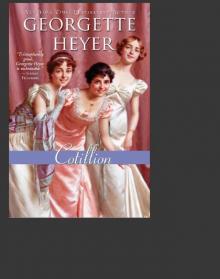 Cotillion
Cotillion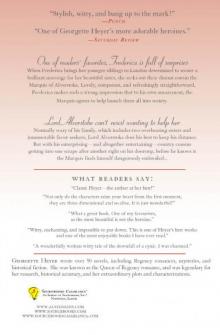 Frederica
Frederica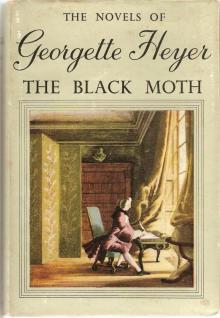 The Black Moth: A Romance of the XVIIIth Century
The Black Moth: A Romance of the XVIIIth Century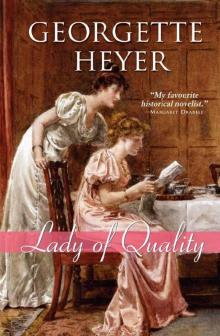 Lady of Quality
Lady of Quality Snowdrift and Other Stories
Snowdrift and Other Stories An Infamous Army
An Infamous Army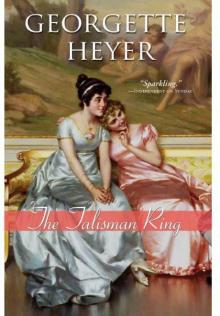 The Talisman Ring
The Talisman Ring Venetia
Venetia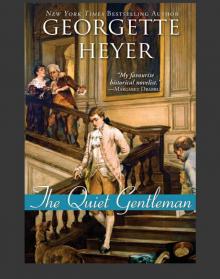 The Quiet Gentleman
The Quiet Gentleman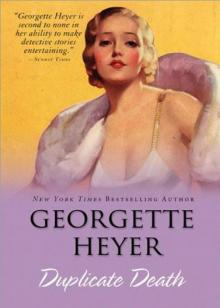 Duplicate Death
Duplicate Death Cousin Kate
Cousin Kate Black Sheep
Black Sheep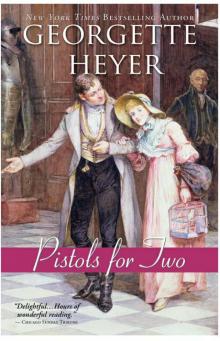 Pistols for Two
Pistols for Two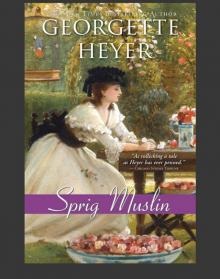 Sprig Muslin
Sprig Muslin No Wind of Blame
No Wind of Blame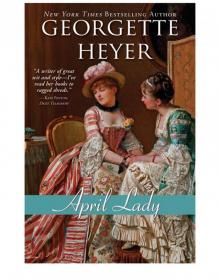 April Lady
April Lady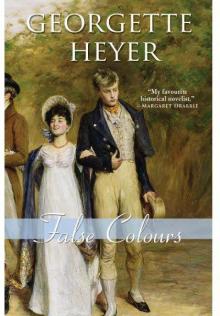 False Colours
False Colours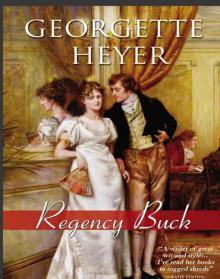 Regency Buck
Regency Buck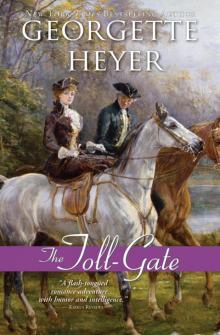 The Toll-Gate
The Toll-Gate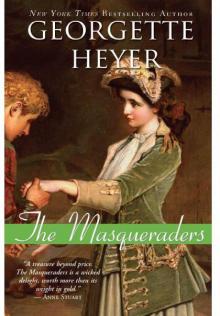 The Masqueraders
The Masqueraders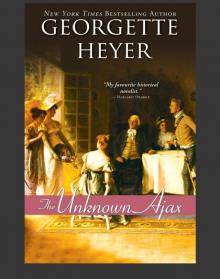 The Unknown Ajax
The Unknown Ajax The Grand Sophy
The Grand Sophy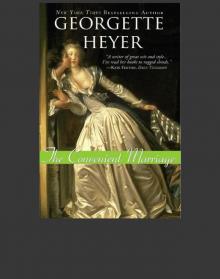 The Convenient Marriage
The Convenient Marriage Faro's Daughter
Faro's Daughter The Conqueror
The Conqueror The Foundling
The Foundling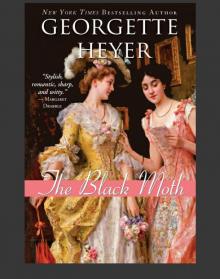 The Black Moth
The Black Moth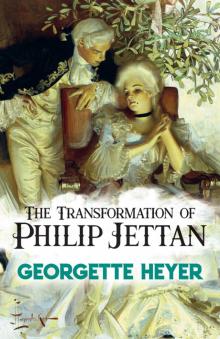 The Transformation of Philip Jettan
The Transformation of Philip Jettan Friday's Child
Friday's Child Beauvallet
Beauvallet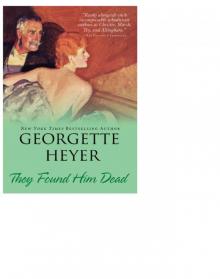 They Found Him Dead
They Found Him Dead Charity Girl
Charity Girl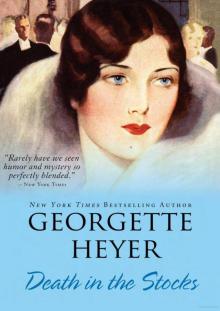 Death in the Stocks: Merely Murder
Death in the Stocks: Merely Murder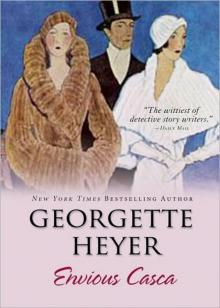 Envious Casca
Envious Casca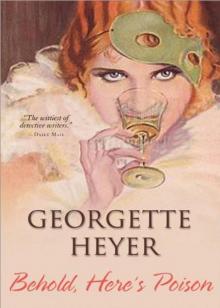 Behold, Here's Poison
Behold, Here's Poison Arabella
Arabella The Nonesuch
The Nonesuch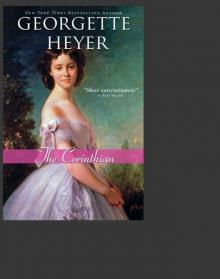 The Corinthian
The Corinthian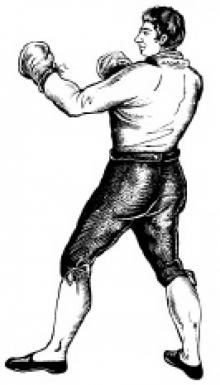 Jennifer Kloester
Jennifer Kloester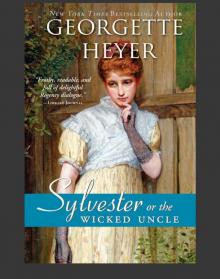 Sylvester
Sylvester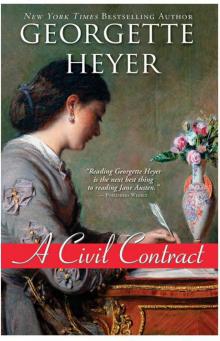 A Civil Contract
A Civil Contract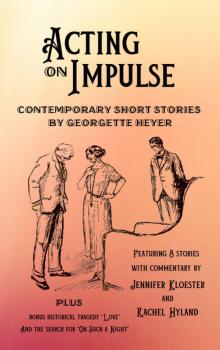 Acting on Impulse
Acting on Impulse Devil’s Cub at-2
Devil’s Cub at-2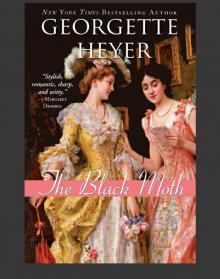 Black Moth
Black Moth Grand Sophy
Grand Sophy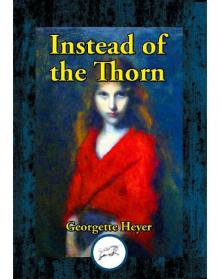 Instead of the Thorn
Instead of the Thorn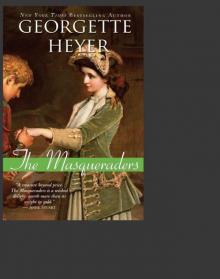 Masqueraders
Masqueraders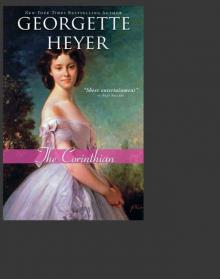 Corinthian
Corinthian Reluctant Widow
Reluctant Widow